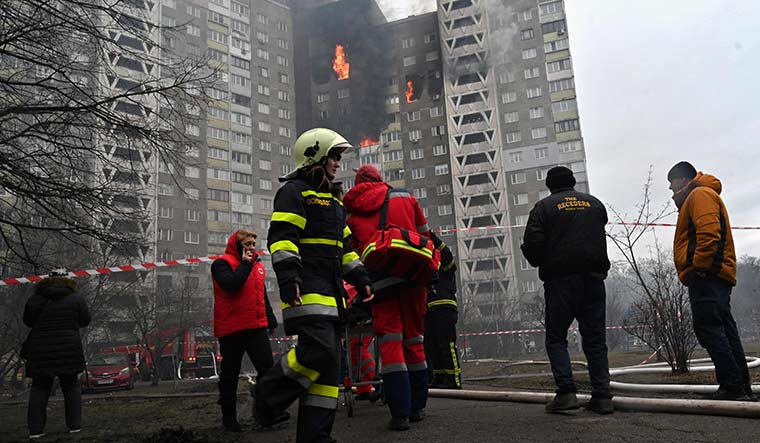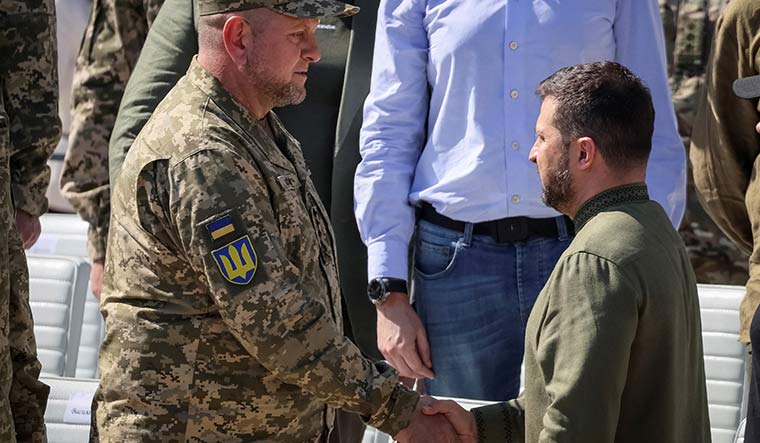For a week from January 29, speculation was rife regarding the removal of Ukraine's commander-in-chief, General Valeriy Zaluzhnyi. There were anonymous quotes and leaks, especially in news and analysis from western media—most of it from military journalists, bloggers, MPs and politicians. The names of the two contenders to replace Zaluzhnyi were mentioned—army chief General Oleksandr Syrskiy, who was instrumental in liberating Kharkiv and Kherson in 2022, and military intelligence head, General Kyrylo Budanov. But it was reported that both of them refused. Zaluzhnyi was reportedly offered the chair of the National Security Council, which he turned down. While the people of Ukraine anxiously watched, initial statements from presidential spokespersons refuted all speculation.
No sooner had the debate calmed down than it rose again, when Zelensky broke his silence. On February 5, he told Italian radio Rai 1 that he wanted to change some leading figures in the country, not only in the army. His statement broadened the horizon of the changes and the first change came that day itself with the resignation of the minister in charge of veterans’ affairs, Yulia Laputina, who was appointed in 2020. Finally, on February 8, Zelensky announced Zaluzhnyi’s dismissal and named Syrskiy as his successor.
Among the possible reasons for the dismissal of Zaluzhnyi are the differences regarding the war strategy and Zaluzhnyi’s growing popularity, with ratings above 90 per cent. Zaluzhnyi was appointed in 2021 before the war, and he rose to prominence after 2022, as the war progressed. While the Ukrainian political leadership failed to anticipate the attack and to ask people to evacuate, Zaluzhnyi and his team tried their best to conduct trainings and to manage fortifications. They also made attempts to protect their fighter planes and to hide crucial resources. That gave Ukraine its first signs of resilience as Russia failed to get Kyiv “in three days” and also the northeast.
Zaluzhnyi became one of Time magazine’s 100 most influential people of 2022. His popularity has not waned, although the much promised counteroffensive in 2023 did not yield the desired results. This was primarily because Ukraine's allies did not supply the required military aid. In an article in the Economist in November 2023, Zaluzhnyi described these points, his perceptions and the mistakes in detail, concluding that the war had reached a stalemate. This was criticised by Ihor Zhovkva, deputy head of the president’s office. Zaluzhnyi’s media exposures led to apprehensions that he might be harbouring political ambitions.
On November 20, in an interview with The Sun, Zelensky expressed his dissatisfaction: “With all due respect to General Zaluzhnyi and all commanders on the battlefield, there is a clear understanding of the hierarchy. It is singular, according to the law, and during the war, it cannot even be discussed. [Questioning] it does not lead to national unity.”
Soon afterwards, the issue of a rift between the political and military leaderships came up. Opposition politicians, notably former president Petro Poroshenko, said dismissing Zaluzhnyi might harm national unity. Former prime minister Yulia Tymoshenko also supported Zaluzhnyi and said that his dismissal when the war was going on was not judicious. Kyiv Mayor Vitaliy Klitschko also voiced similar concerns.
But, we know from history that generals were dismissed during wars, either because of poor performance or for showing signs of defiance. General Douglas MacArthur was fired by president Harry S. Truman during the Korean War; during the American Civil War, Abraham Lincoln grew frustrated with General George McClellan and fired him. In Zaluzhnyi’s case, it is neither poor performance, nor defiance, rather some differences. Therefore, on February 5, Zelensky, referring to these controversial issues, said, “A reset and a new beginning is necessary. I am thinking about the change (without specifically mentioning the name of Zaluzhnyi), it is true. This is related to the whole management which is at the helm of the country.”
 Fighting spirit: Ukrainian rescuers at a residential building damaged in a Russian missile attack in Kyiv on February 7, 2024 | AFP
Fighting spirit: Ukrainian rescuers at a residential building damaged in a Russian missile attack in Kyiv on February 7, 2024 | AFP
These statements have caused a ripple of reactions among the Ukrainian citizens. We must never forget that people—although they do not hold the reins of power—like “to feel the pulse”, always. The war has only deepened their commitment. The communication on this issue between the political leadership and the people was not timely and well-managed, to say the least.
We know that all international armed conflicts are information warfare. The Russians have not left a single stone unturned to use propaganda to their benefit, both at home and abroad, meticulously catering to respective target groups and regions with their vertical chain of command. Ukraine being a democratic country is facing a bigger dilemma with its merits and vulnerabilities. Information in Ukraine is never vertically controlled. Despite the unified nationwide news service, cable channels operate freely, not to speak of blogs and social networks. The Ukrainian media holds the key. Alina, a journalist working for a local media outlet, asked, “Why do we have to learn about our internal news from foreign news sources?” Ukraine’s blogosphere echoed her remarks manifold. Journalists are visibly upset.
The war brought sweeping changes in the world of statecraft. It has also shown what ordinary people can do for their country. It has proved that whatever political decisions are taken, people have to bear the consequences. Zelensky’s desire to reset has added more responsibility and challenge on his shoulders. One such challenge is that his track record of being an excellent communicator now needs some fine-tuning. He should be able to instil confidence among people, who still doubt the rationale of his decision.
After Zaluzhnyi's dismissal and Syrskiy’s appointment as commander-in-chief was formally announced by Zelensky, more reserved remarks emerged—calling for calm and stating that the main idea and strategy of the war will never change. Zaluzhnyi's ouster should not mean a 180-degree reversal, or any change at all. Rotation of military officers is a regular phenomenon. However, the task of getting resources, funding the war and carving the path to victory would get longer and complicated. I thought it must be tough for the soldiers themselves. I hesitated, but still asked my acquaintance Olexiy, who fought at the front, and was on leave for 10 days, about Zaluzhnyi's dismissal. Olexiy was calm, and told me, “I have seen so much there. Life in the trenches, in open fields, firing from all sides. I know for certain: change is life. Let people change. Our aim should not change. We have to fight and win, as the proverb goes, à la guerre comme à la guerre.” This literally means, to be at war is at war, that is, one must make the best of each situation. The fine line is how change will ensure uninterrupted continuity.
Mridula Ghosh, formerly with the UN, is based in Kyiv, and teaches at the National University of Kyiv Mohyla Academy.



